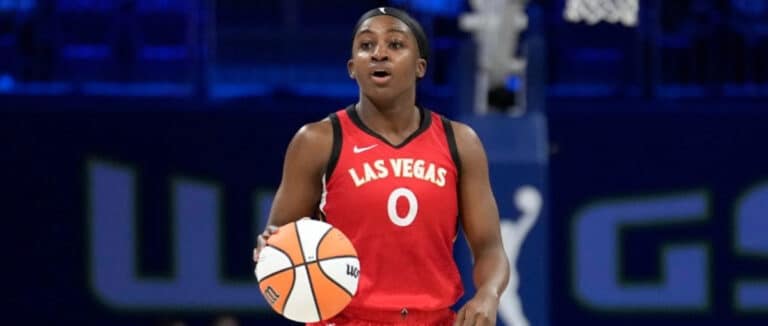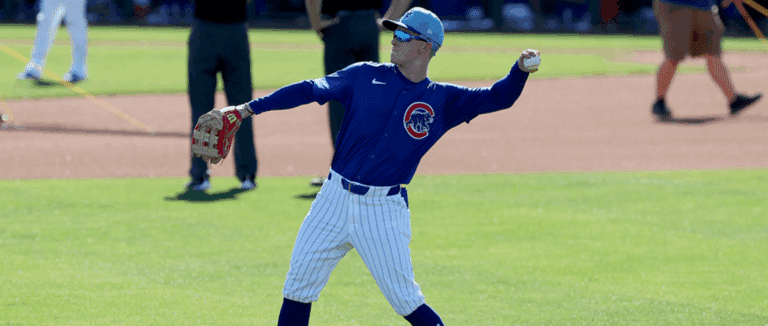Introduction to Sports Betting Terms, Slang, and Concepts

byMatt Brown | Published: January 3, 2024
Filed Under: Blog, Sports Betting Basics

When discussing the intricacies of sports betting, we often throw around slang you might not understand. So, we’ve compiled a comprehensive glossary of all the sports betting terms and slang so you can talk like a pro.
Basic Betting Concepts
- Moneyline. This is one of the most straightforward bets you can place. When you bet on the moneyline, you choose which team you think will win the game outright. No point spreads are involved here; it’s all about the winner. For example, if you bet on Team A to win, and they do, you win your bet.
- Point Spread. This bet adds a layer of complexity to a traditional moneyline bet. The point spread, sometimes simply referred to as the spread, is essentially a handicap given to one of the teams for betting purposes. Let’s say the Green Bay Packers are favored to win by 3 points over the Chicago Bears. If you bet on the Packers, they need to win by more than 3 points for you to win your bet. If you bet on the Bears, they need to win the game outright or lose by less than 3 points.
- Over/Under (Total). With an over/under, you’re not betting on which team will win, but rather the total combined score of the two teams. The bookmaker sets a number, and you bet on whether the total score will be over or under that number. For instance, if the over/under on an NHL game is set at 6.5, and you bet on the over, you need the total score to be seven or more to win your bet.
- Juice (Vig, Vigorish). This is how the bookmakers/sportsbooks make their money. It’s a fee or commission that they charge on bets. For example, if you see odds listed as -110, it means you need to bet $110 to win $100, with the $10 being the juice. It’s a major consideration as it affects the profitability of your bets over time.
- Payout. This term refers to the amount you receive when you win a bet. The payout includes your original stake plus the winnings. For example, if you bet $100 on a team with 2:1 odds, your payout will be $300 if you win – your initial $100 back plus $200 in winnings.
- Handicap Betting. A bet where a virtual advantage or disadvantage is assigned to competitors to level the playing field. It’s different from point spreads as it’s used in sports with multiple competitors, not just two teams. For instance, in a golf tournament, a player might begin with a handicap of +3, giving them a starting advantage.
- Fixed Odds Betting. A form of betting where the odds are set at the time of placing the bet and do not change. This determines the payout regardless of market fluctuations after the bet. For example, if you bet on a team at 5:1 odds, those odds stay fixed, and your payout is based on these odds.
Types of Bets
- Parlay, Accumulator (Acca), Combo Bet. Think of a parlay as a combo bet. You’re linking several bets into one. For instance, you might bet on three games, and all of your selections must win to win the parlay. It’s a bit riskier because the entire parlay is lost if even one bet loses. But the upside? The payout is much higher than if you had placed each bet separately. It’s high risk — high reward.
- Prop Bet (Proposition Bet). This is where you get to bet on the specifics of a game, not just who wins or loses. Prop bets can be about anything from which player will score first to how many yards a quarterback will throw. It’s a fun way to engage with the game beyond the traditional win-loss scenario, offering a unique angle to betting. You can win some serious cash if you have deep insights into a player.
- Lay Bet. This is when you bet against an outcome. Essentially, you’re taking on the role of the bookmaker. For example, if you lay a bet on a team, you win if they lose or draw. It’s a popular concept in betting exchanges where you can back and lay bets.
- Futures. As the name suggests, these bets are all about the future. You’re not betting on tonight’s game but rather on an event happening down the road, like who will win the Super Bowl or the NBA Championship. These bets can be placed well in advance, and the odds change as the season progresses, adding an interesting dynamic to your betting strategy.
- Teaser. A teaser is a special kind of parlay. You still combine multiple bets, but here’s the twist: you get to adjust the point spreads in your favor. This makes it a bit easier to win each bet within the parlay. However, there’s a trade-off – the payouts are typically lower than a standard parlay because of the adjusted odds.
- Live Betting. This is betting in real time. As the game actively unfolds, you place your bets. The odds constantly change in real-time based on what’s happening in the game. It’s dynamic, exciting, and requires quick thinking. You might bet on who will score next, the outcome of the next play, or even the final score.
- Same Game Parlay (SGP). With an SGP, you combine multiple bets from the same game into one wager. This can include betting on the point spread, over/under, and player prop bets, all within the same game. It’s similar to a traditional parlay but confined to a single event, offering a unique betting experience with potentially higher payouts.
Betting Strategies and Concepts
- Hedge. Think of hedging as an insurance policy in betting. It’s when you place a bet on the opposite outcome of your original wager to either minimize potential losses or guarantee a small profit. For example, if you’ve bet on Team A to win a championship, and they make it to the final, you might then bet on Team B in the final. This way, no matter the outcome, you’re cushioned against a total loss.
- Arbitrage. This is a bit like playing the betting market. In arbitrage betting, you take advantage of differing odds at different sportsbooks to guarantee a profit, regardless of the outcome. You bet on all possible outcomes of an event, but because the odds are different, you’re sure to make money. It requires some skill in finding these opportunities and quick action to take advantage of them.
- Bankroll. Simply put, your bankroll is the total amount of money you’ve set aside for betting. It’s important to manage this wisely. The key here is not to bet more than you can afford to lose and to set limits on how much you bet on each event. Effective bankroll management is critical for long-term success in betting.
- Sharp. This term refers to an experienced, skilled bettor who often uses sophisticated strategies and deeply understands betting markets. Sharps are known for their disciplined approach and ability to make profitable bets consistently. They are the ones the sportsbooks pay close attention to because their bets can often influence the odds.
- Square. This is the opposite of a sharp. A square is a more casual, less experienced bettor, often betting for fun or based on a hunch rather than a well-researched strategy. Squares typically follow popular opinion, bet on favorites, and may not have a disciplined approach to bankroll management.
Betting Outcomes
- Push. A push is a tie. It’s neither a win nor a loss for betting purposes. This is called a push. It usually happens when the game’s outcome lands exactly on the point spread or if it ends in a draw in a situation where no draw wager was offered. In such cases, all bets are returned to the bettors, so it’s like the bet never happened.
- Bad Beat. This is a bet that seemed like a sure win but ended up losing due to unexpected or last-minute events. It’s the kind of loss that leaves you shaking your head in disbelief. For example, you bet on a team leading by a significant margin, only for the opposing team to make a miraculous comeback in the final moments.
- Cover. This one’s about beating the spread. When you hear someone say a team “covered the spread,” it means the favorite won by more points than the point spread, or the underdog lost by fewer points than the spread, or even won the game outright.
Other Sports Betting Terms
- Handle. This is the total amount of money wagered on a specific event or over a certain period. It’s an indicator of the betting volume a sportsbook is handling. For instance, during big events like the Super Bowl, the handle can reach exceptionally high numbers, reflecting the betting activity and interest in the event. In Nevada, the handle for Super Bowl LVII was $153 million.
- Bookmaker (Bookie). A bookmaker, or ‘bookie,’ is the individual or organization that takes your bets. They set the odds, accept the wagers, and pay out winnings. They’re like the referee in the world of sports betting, balancing the books to ensure they make a profit irrespective of the event’s outcome.
- Gubbed. Being “gubbed” refers to the situation where a sportsbook restricts or limits an account due to the user’s consistent wins or because they’re suspected of arbitrage betting, where a bettor takes advantage of the varying odds offered by different bookmakers to ensure a profit regardless of the outcome. When an account is gubbed, the user might find that they’re no longer eligible for promotions, bonus bets, or other kickbacks, and they may experience significantly reduced betting limits.

Matt Brown
Head of Sports Betting and DFS
Matt’s love for sports betting and daily fantasy sports, coupled with a deep understanding of football, hockey, and baseball, shapes his innovative thoughts on Hello Rookie. He has a B.S. in Aeronautical Computer Science and a M.S. in Project Management.







